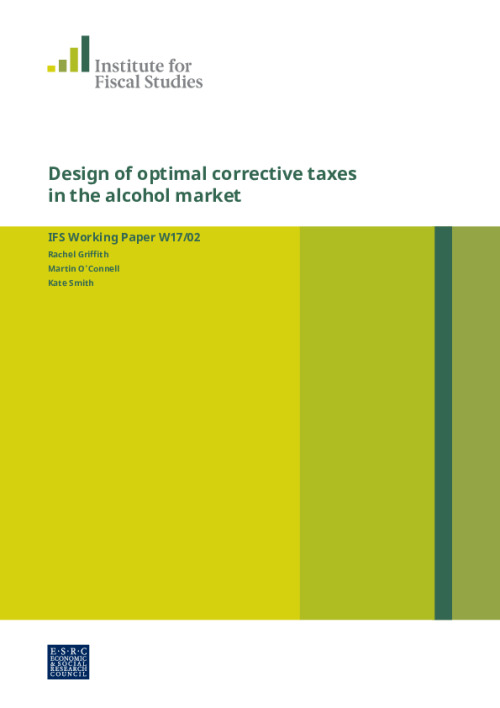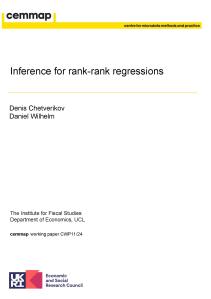Downloads

WP201702.pdf
PDF | 829.11 KB
Alcohol consumption is associated with costs to society due to its impact on crime and health. Tax can lead consumers to internalise these externalities. We study optimal corrective taxation in the alcohol market. We allow for the fact that the externality generating commodity (ethanol) is available in many di fferentiated products, over which consumers might have heterogeneous preferences, and that there may also be heterogeneity in marginal externalities across consumers. We show that, if there is correlation in preferences and marginal externalities, setting different tax rates across products can improve welfare relative to a single tax rate on ethanol. We estimate a model of demand in the UK alcohol market and numerically solve for the optimal tax rates. Moving to an optimal system that taxes alcohol types at different rates would close half of the welfare gap between the current UK system and the fi rst best.
Watch IFS researcher, Kate Smith, talking about the design of alcohol taxes.
A more recent version of this working paper is available here.
Authors

CPP Co-Director, IFS Research Director
Rachel is Research Director and Professor at the University of Manchester. She was made a Dame for services to economic policy and education in 2021.

Research Fellow University of Wisconsin
Martin, previously Deputy Research Director, is a Research Fellow at IFS and Professor of Economics at the University of Wisconsin.

Research Fellow London School of Economics
Kate is an IFS Research Fellow and an Assistant Professor at LSE, interested in public finance, industrial organisation and applied microeconomics.
Working Paper details
- DOI
- 10.1920/wp.ifs.2017.1702
- Publisher
- The IFS
Suggested citation
R, Griffith and M, O'Connell and K, Smith. (2017). Design of optimal corrective taxes in the alcohol market. London: The IFS. Available at: https://ifs.org.uk/publications/design-optimal-corrective-taxes-alcohol-market-0 (accessed: 30 June 2024).
More from IFS
Understand this issue

Gender norms, violence and adolescent girls’ trajectories: Evidence from India
24 October 2022

What are the challenges in getting debt on a falling path?
28 June 2024

Election Special: Your questions answered
27 June 2024
Policy analysis

IFS Deputy Director Carl Emmerson appointed to the UK Statistics Authority Methodological Assurance Review Panel
14 April 2023

ABC of SV: Limited Information Likelihood Inference in Stochastic Volatility Jump-Diffusion Models
We develop novel methods for estimation and filtering of continuous-time models with stochastic volatility and jumps using so-called Approximate Bayesian Compu- tation which build likelihoods based on limited information.
12 August 2014

Is there really an NHS productivity crisis?
17 November 2023
Academic research

Inference for rank-rank regressions
28 May 2024

Understanding Society: minimising selection biases in data collection using mobile apps
2 February 2024

The impact of labour demand shocks when occupational labour supplies are heterogeneous
28 June 2024